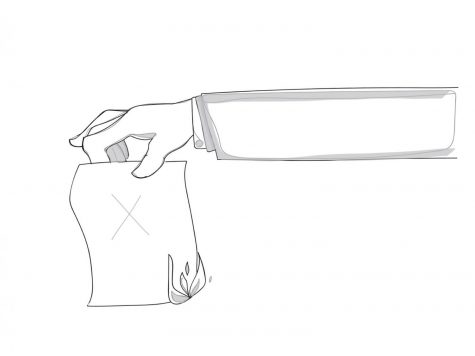A beacon of hope
Photo: Emily O'Connell
April 4, 2018
Immigration is the cornerstone of the American experience. Our entire country was built by immigrants, and our first seven presidents were born British subjects before they assumed the highest office in the land.
However, America is now faced with an immigration crisis. Dreamers, children who are protected under DACA, were brought into America by their parents as children with no say in the matter. Why should they be deported to a country they have not lived in since they were toddlers? Besides their nation of birth, they are Americans, attending the same schools, eating the same food and making the same friends as any other American, yet they constantly live in fear of deportation. A simple speeding ticket could result in their deportation.
This worry is one that Dreamers should not have to have, especially when they have spent most of their life in America.
The supposed controversy of DACA has been blown out of proportion in the media. A recent CBS News Poll indicates that 87 percent of Americans support the continuation of the DACA program. That support is for a good reason.
These children are not criminals, despite the stereotype some people associate with undocumented immigrants. DACA has a strict list of provisions for eligibility for the program, including that one must have been under 16 when they came to the U.S., have a high school diploma or GED and have no felony or serious misdemeanor convictions.
While some worry about the constitutionality of DACA, given its creation through President Obama’s executive order, no court has ruled DACA unconstitutional. Further cementing its legality, Congress has given the executive branch, under Title 8 Chapter 21 Section 1103 of the U.S code, discretion over “administration and enforcement of immigration laws.” Since DACA falls under this clause, it is unquestionably legal.
While DACA provides some protection to its participants, more should be done to safeguard these immigrants’ futures. As it stands, there is no pathway towards citizenship for Dreamers, stranding them in a legal limbo. The next incarnation of DACA should provide amnesty for its recipients, granted that they maintain a good standing in the community and are contributing members of society.
To keep these Dreamers in this immigration purgatory is not fair to them or the country since it prevents them from achieving their full potential.
Amnesty granting is not something foreign to immigration policy. In fact, it was Ronald Reagan who signed into law amnesty protection for 8 million undocumented immigrants in 1987. If the father of modern conservatism can understand the benefits of protecting these people, surely Congress can see the same future of the Dreamers.
Dreamers are supported by the majority of the country and their protection under DACA is completely legal. We as Americans have to set aside our fears and prejudices to welcome the tired, the poor, the huddled masses yearning to breathe free and, as one nation, lift the lamp to our golden door.




